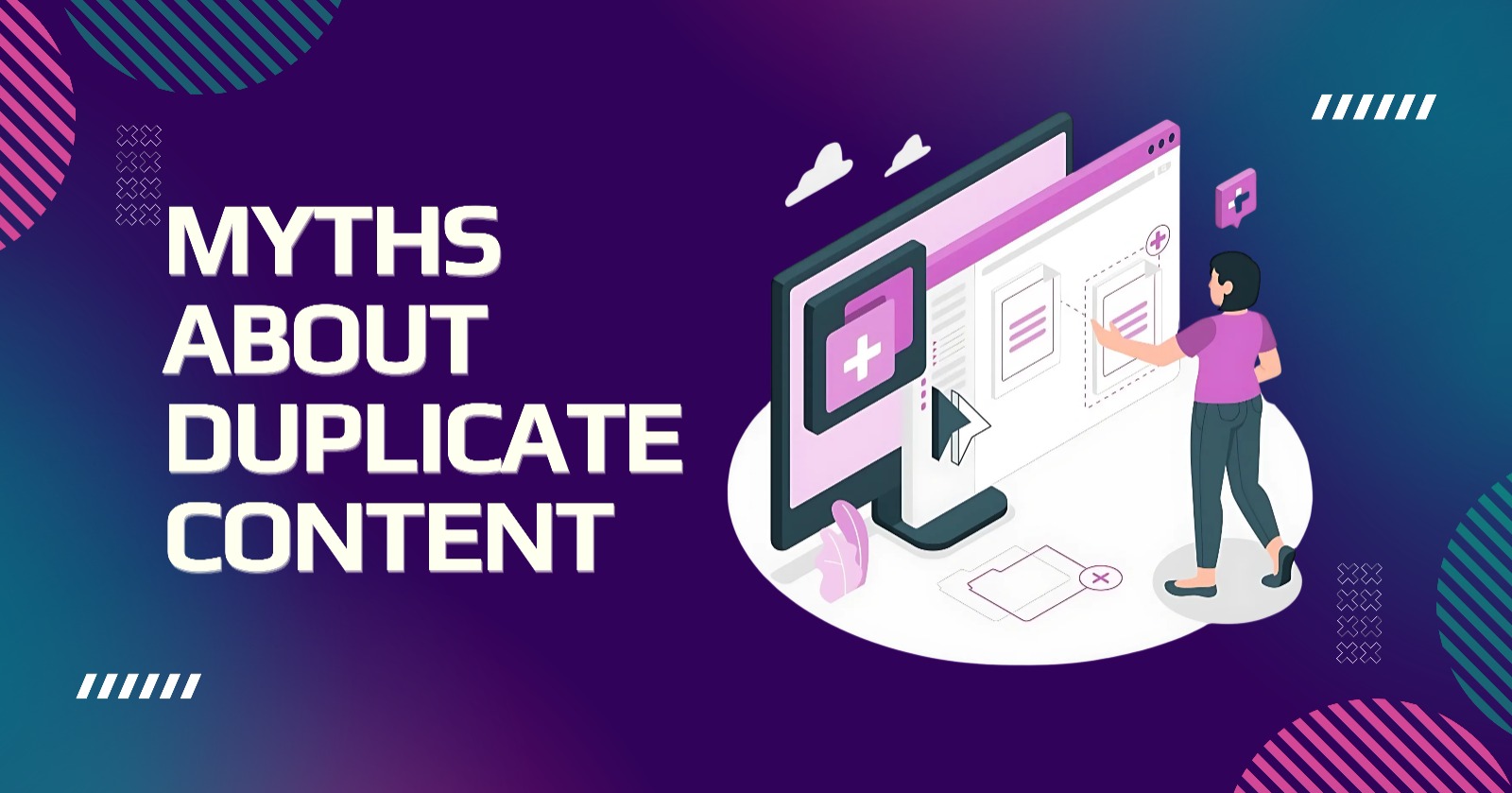Keeping up with evolving SEO and search engine ranking trends requires you to get hold of so much information coming from the experts. In the wake of staying updated with new or obsolete website indexing or ranking practices, we come across a large pool of information, which is not always authentic or factually correct and leads users to believe in misconceptions or incorrect practices or facts. The same is the case with publishing the same content twice or thrice on different pages of the same or different websites.
There are a lot of myths about duplicate content running in the channels, which need to be busted to get better rankings for your website and save your site from getting penalties.
What is content duplication?
Content duplication is the use of the same content, such as a product description, blog post, or any other piece, on more than one website page internally or on different websites externally. It is usually identified by the same URL or canonical tags placed by the hosts of the website.
For example, a press release that you have shared on different websites will be considered duplicate content, no matter whether you own all the domains on which you have published the same press release.
However, using one press release on different websites will not harm your SEO rankings because the press release needs to be the same across the platforms. Copying the original content of other sites and publishing it on your own will be flagged as duplicate content and may result in penalties from search engines.
Different types of duplicate content
There are usually three types of content pieces that fall under the category of content duplication and may lead you to face punishment from Google. According to Google, the content that is plagiarised or paraphrased will be penalised due to content duplication or deceptive action by the authors.
Content copied from others
If you have copied blogs or other content pieces from other sites without their permission and are using it on your sites. Then, the chances of being penalised by Google for content duplication are high for you. So don’t ever post plagiarised content on your website to stay afloat in SEO rankings.
On-site content
Using the same content, like a product description with the same canonical tag or URL, is also considered duplicate content. Using similar meta titles or descriptions and the same reels or videos on different website pages is also flagged as duplicate content. For example, you are offering free artificial intelligence apps, and the URL looks like this:
“https://delivix.digital/ai/free-artificial-intelligence-apps/”
And when you are offering exclusive access to free artificial intelligence apps, then the URL will be:
“https://delivix.digital/ai/free-artificial-intelligence-apps/giveaway”
Now, you are offering the same thing on two different website pages and using the same image, which makes it duplicate or deceptive in view of Google Webmaster guidelines.
| “Duplicate content on a site is not grounds for action on that site unless it appears that the intent of the duplicate content is to be deceptive and manipulate search engine results. If your site suffers from duplicate content issues, and you don’t follow the advice listed above, we do a good job of choosing a version of the content to show in our search results.” |
Paraphrased content
Spinning content taken from AI writing tools and other websites to publish as your own and unique will not help you boost your website rankings. On the other hand, it will make Google mark your content as deceptive or manipulative to search engine results because the same content pieces are already available and are in rankings.
So always try to publish original and unique content on your unique website design to get high on the search engine results page.
Why do you need to avoid content duplication?
If your website still has pages that are being duplicated by your content management system (CMS), like the same content with different URL links, then there are evident chances that Google, while crawling and indexing, picks the page that is duplicated and shows it to the results page.
It is not necessary that Google will always pick the right page that addresses the queries of the users to establish your website authority. It can pick the wrong page as well and may flag it as duplicate content and stop showing your website pages on SERPs.
Always make sure to use canonical tags and the right URL for every page to make things clear for Google to index.
Looking for SEO Services?
Our SEO experts will boost your rankings, drive traffic, and increase conversions.
Get Found. Get Leads. Get Sales.
Book a ConsultationHow to check for content duplication on your website?
Several tools are available online to find duplicate pages of your website within minutes. All you need to do is pick a suitable tool and start analysing your website content to remove and manage duplicate pages.
1. Copyscape:
It will make you check the copies of your website pages available across the search engines to help you eliminate the ones plagiarised by others and remove the ones that are in control of you.
You can request the site host to delete the content copied from your site and use the Digital Millennium Copyright Act by completing Google’s Legal Troubleshooter.
2. Moz:
It will help you to find which pages are showing duplicate content on your site and the origins of the copy as well. So you can keep the original page and remove or manage the duplicate pages, whatever suits you, to stay safe from Google penalties upon content duplication.
You can use whatever tool you find suitable for your website and make it free from harming duplicate content pages.
Myths about duplicate content & its impact on SEO
Now, you are well aware what is duplicate content and how it can affect your website position on SERPs. It’s time to debunk the common myths about duplicate content and its effects on SEO. We have selected the most common wrong beliefs spread around the new website owners and even experts.
So that you won’t make further decisions based on the wrong facts and actually miss on ranking high in search engine results.
1. Google penalises all duplicate content:
Google doesn’t love to penalise all duplicate content unless it is deceptive or spammy. So you don’t need to be stressed about the duplicate content on your website. Keep focusing on publishing value-driven and SEO optimised blogs and other content pieces to stay abreast of the rankings.
For example, if you have the same meta title and H1 of the blog, Google will not flag it as duplicate because it is part of one page, and in case both are available on more than two website pages internally and externally, then it will be flagged as spammy due to deceptive behaviour and may result in negative rankings.
2. Duplicate content kills your SEO rankings:
It is a mere myth that having duplicate content on your website will result in poor SEO rankings. Blogs and product descriptions usually tend to be considered duplicate content but can be managed easily using canonical tags.
However, if you are creating high-value content meeting Google’s E-E-A-T content update requirements, then your page is going to be surely ranked higher than the other existing duplicate ones. You can make your blog or reel stand out among the other pieces that are duplicated by sharing or getting reshared on social media platforms like Facebook, Instagram, and so on.
Your duplicate content will not bring lower positions in SEO ranking to you but poor quality and plagiarised content from others will surely get you low at rankings.
3. Republishing the same content always hurst rankings:
It is not true that the guest posts that have brought healthy backlinks or tons of new audiences to your website will hurt your SERP rankings when published on your own site.
We all love guest posts because it is the most efficient way to get healthy backlinks on your websites, but having more outbound links than inbound on one post can be drastically dangerous for your site.
That’s why make sure only to repost quality guest posts on your own site so as not to get caught up in content duplication and its adverse effects.
4. Content scraping can lead to penalties:
Content scraping is not a really bad thing unless it is just some random bots crawling your website pages and stealing your content to publish on different sites. Usually, scraped content doesn’t get up to the mark of being ranked and Google after one crawling deem it irrelevant to be indexed.
If a piece of content that is scraped and copied from your site is ranking above your original content then you can contact the site’s host to remove the post or even consult with Google to get the post down. All in all, content scraping doesn’t really help websites to rank or hurt their rankings.
5. AI content is flagged as duplicate content:
It is a common myth about duplicate content that AI-generated blogs or other marketing pieces are deemed as in-valuable and get penalised by Google. On the contrary, a web page that has AI-generated content published on it but is providing value and quality information to the audience can’t be flagged as duplicate content or penalised due to tool-generated information.
However, the policies of Google content ranking are changing at a fast pace, so it’s better to revisit the Google content centre to stay current with the trends.
6. Every website page needs to be unique for ranking:
It is not possible to write new or unique legal disclaimers or product descriptions for every page separately to make every page of the website unique. You don’t need to be worried about it as well because having the same content pieces on your website doesn’t hurt your SEO rankings in any way.
In the case of writing landing pages for the same service but set in multiple locations, there are chances that some content similarity may occur among those pages and fall under the shade of content duplication, but it will not be penalised by Google.
7. Google is unable to distinguish original and plagiarised content:
It is a completely false statement that Google can’t differentiate between duplicate and original content pieces. Google algorithms are smart enough to differentiate between the original and plagiarised content using URLs and canonical tags to confer rankings.
If your content is copied or used by any site without your permission, you can contact the legal support team of Google to get it removed.
How to manage content duplication on your website?
You can follow the tips mentioned below to manage duplicate content on your website and take a helping hand by contacting any expert to get things sorted professionally with the right approach.
- Use canonical tags:
To stop getting your content flagged as duplicate, you can use canonical tags to stop Google from indexing variations of the same page as different pages. If you run an e-commerce store and sell jeans then there are chances that search engines will consider variations of size and colour as different content pieces and crawl them separately.
You can just add the Rel=Canonical tag to specify pages for search engines to index and rank.
- Set up 301 redirects:
When a user hits your website through the link, you have placed on the guest post that is published on another site.
Search engines like Google will confuse the URLs as one and revert traffic to the same site. Setting up 301 redirect links will help you to send the traffic to the URL of your website and Google to consider both as separate URLs.
- Set no index tags:
Sometimes we don’t want to get certain pages indexed by Google to get rankings, but when there are no tags attached to such pages. Search engines automatically consider them for indexing, which can really hurt your SEO rankings. That’s why always set no index tags to avoid getting your website rankings hurt.
- Track content with Google Search Console:
Google Search Console is the most comprehensive platform to rely on for identifying and resolving content duplication issues. That’s why you should prefer to use it for getting hold of potential duplicate content pages and sorting out things timely to save your websites from getting penalties from Google and lower your SEO rankings.


